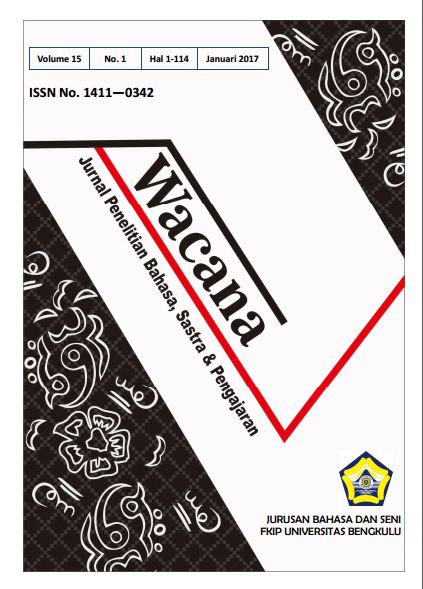Main Article Content
Abstract
This study aimed to describe a form of politeness pragmatic imperative in the learning process of students in class VIII SMP Negeri 1 Pondok Kelapa Central Bengkulu. This research is a qualitative description. The data in this study is data in the form of verbal utterances in students' interaction with students, and students and teachers in the classroom environment of SMP Negeri 1 Pondok Kelapa Central Bengkulu. The collection of data by observation, recording, and recording. Analyzing data with several stages of the (1) transcription of data, (2) the encoding of data, (3) identification of the data, (4) the classification of data, (5) the interpretation of the data, and (6) the stage of inference. Based on the results of research on the form of pragmatic politeness imperative in the learning process of students in class VIII SMP Negeri 1 Pondok Kelapa Central Bengkulu consists of nine utterances which implies a pragmatic imperative which consists of commands, requests, insistence, persilaan, solicitation, requests permission, permit, prohibition, and ngelulu. Imperative meaning is marked by a form of politeness in the imperative form of speech commands using particle was the one, -kan, narration imperative requests please use the phrase, speech urging imperative to use speech that is spoken repeatedly, speech tuturannya form is imperative persilaan please, yes, speech imperatively calls to use the phrase of speech !, let imperative allow tuturannya form is right, yes., speech imperative ban on using the phrase do, and speech is imperative ngelulu form tuturannya keep saying but actually the intended meaning is to stop.
Kata Kunci: Pragmatic, Politeness Imperative.
Article Details
Authors who publish in this journal agree with the following terms:
- Authors retain copyright and grant the journal right of first publication with the work simultaneously licensed under a Creative Commons Attribution License that allows others to share the work with an acknowledgement of the work's authorship and initial publication in this journal.
- Authors are able to enter into separate, additional contractual arrangements for the non-exclusive distribution of the journal's published version of the work (e.g., post it to an institutional repository or publish it in a book), with an acknowledgement of its initial publication in this journal.
- Authors are permitted and encouraged to post their work online (e.g., in institutional repositories or on their website) prior to and during the submission process, as it can lead to productive exchanges, as well as earlier and greater citation of published work (See The Effect of Open Access).
- This work is licensed under a Creative Commons Attribution-ShareAlike 4.0 International License.
